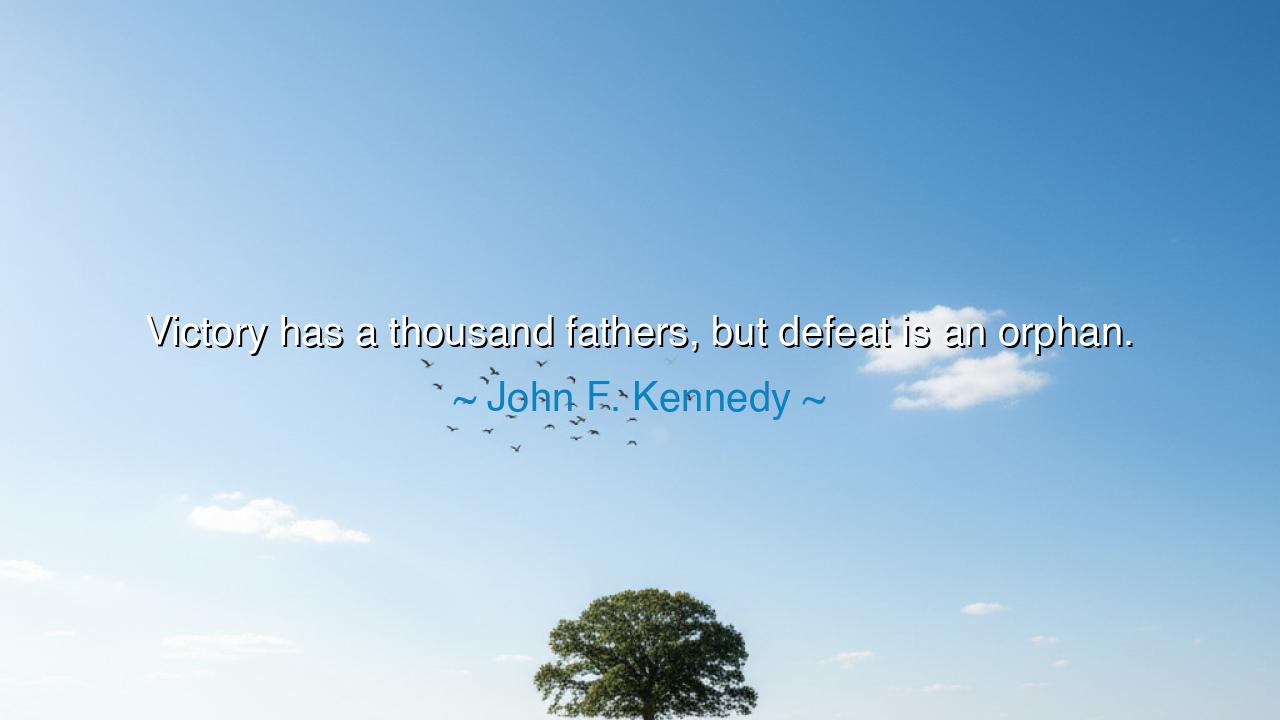
Victory has a thousand fathers, but defeat is an orphan.






Listen, O seekers of wisdom, to the words of John F. Kennedy, a leader whose words continue to echo in the corridors of history: "Victory has a thousand fathers, but defeat is an orphan." These words, spoken in the wake of both triumphs and failures, illuminate a truth as old as time itself—the fleeting nature of success and the solitude of failure. In times of victory, all are quick to claim their share of the glory, but when defeat arrives, it is often met with silence, rejection, and the absence of those who would dare to claim responsibility.
To understand the weight of Kennedy's words, let us reflect on the nature of victory and defeat. In ancient times, when kingdoms rose and fell, the story was always the same. In the midst of victory, the heroes were celebrated, their names sung in epic poems, and their deeds lauded as the highest virtues. Consider Alexander the Great, whose victories stretched across continents, leaving behind a legacy of glory. Yet, for every victory he achieved, there were a thousand who would take credit for the glory—generals, soldiers, and advisors who flocked to the source of power to claim their share of the spoils. Victory, in these moments, is a communal celebration, where all feel the warmth of the sun.
But defeat is different. When an army is vanquished, when a cause is lost, those who once stood proudly beside the victor often turn their backs, seeking shelter from the storm of failure. Defeat is an orphan because it has no warm embrace, no shoulders to share its weight. Cicero, the great Roman orator, once spoke of the importance of facing defeat with honor, yet he knew, as all who have seen the tides of history know, that in the wake of failure, the crowd disperses, and only the individual is left to face the shame alone. The bitter truth of defeat is that it is often met not with understanding, but with abandonment, as those who once sought to share in the victory now flee from the clouds of failure.
Consider the story of Napoleon Bonaparte, whose meteoric rise to power was followed by his devastating fall after the disastrous Russian campaign. In the moment of his triumphs, Napoleon was surrounded by those eager to bask in the glory of his victories. But after his defeat, those same generals, once his closest companions, abandoned him in his time of need. The power and admiration he had commanded during his reign quickly turned to contempt. His defeat was an orphan, with no one willing to take responsibility for the failure. Victory had many fathers, each seeking to claim their share, but defeat stood alone, a solitary figure in the annals of history.
Kennedy's words, though spoken in the context of politics and leadership, are a reflection of a much broader truth—success is often a shared experience, while failure is something we must face on our own. In the pursuit of any goal, whether in the arts, business, or personal growth, victory is celebrated by all who benefit from it, but defeat is an experience that reveals our true character. Those who remain by your side in moments of failure are those who possess the highest form of loyalty, for they do not seek to claim credit in times of success, but stand with you when the weight of defeat threatens to crush your spirit.
And yet, there is wisdom in defeat that victory cannot teach. In the solitude of failure, we find the opportunity to reflect, to grow, and to rise again stronger than before. Consider Thomas Edison, who faced countless failures before achieving his greatest successes. Each time he encountered defeat, he did not seek the company of those who might have abandoned him. Instead, he stood alone in his resolve, knowing that failure was not the end, but a step on the road to innovation. Edison’s defeats were many, but they were not orphaned—they were the very soil from which his future successes would grow.
Thus, O children of the future, take this lesson to heart: victory will come with many who claim it as their own, but in the face of defeat, you will learn the true measure of your character. Stand firm, even when those around you may abandon you. Let failure be a teacher, one that reveals the strength and resilience that resides within you. Do not seek the validation of others in times of triumph, for that will fade with the next victory. Instead, seek the strength to rise in moments of failure, knowing that true honor comes not in the applause of victory, but in the quiet courage to face defeat and rise again. Victory may have many fathers, but defeat—though an orphan—holds within it the power to shape the greatest leaders, the most resilient souls, and the strongest hearts.






AAdministratorAdministrator
Welcome, honored guests. Please leave a comment, we will respond soon